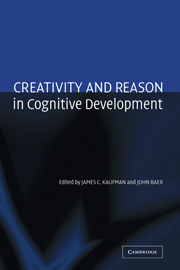Book contents
- Frontmatter
- Contents
- List of Contributors
- Acknowledgments
- Creativity and Reason in Cognitive Development
- Introduction
- COGNITIVE PERSPECTIVES
- 1 Expertise and Reason in Creative Thinking: Evidence from Case Studies and the Laboratory
- 2 Creative Genius, Knowledge, and Reason: The Lives and Works of Eminent Creators
- 3 Dynamic Processes Within Associative Memory Stores: Piecing Together the Neural Basis of Creative Cognition
- 4 The Creativity of Everyday Moral Reasoning: Empathy, Disgust, and Moral Persuasion
- 5 Reasoning and Personal Creativity
- 6 Alternative Knowledge Structures in Creative Thought: Schema, Associations, and Cases
- 7 The Role of the Knowledge Base in Creative Thinking
- 8 The Role of Domain Knowledge in Creative Problem Solving
- 9 Creative Thinking and Reasoning: Can You Have One Without the Other?
- 10 From Alexithymia, Borne of Trauma and Oppression, to Symbolic Elaboration, the Creative Expression of Emotions, and Rationality
- 11 Opening up Creativity: The Lenses of Axis and Focus
- DEVELOPMENTAL AND EDUCATIONAL PERSPECTIVES
- Author Index
- Subject Index
- References
5 - Reasoning and Personal Creativity
Published online by Cambridge University Press: 19 January 2010
- Frontmatter
- Contents
- List of Contributors
- Acknowledgments
- Creativity and Reason in Cognitive Development
- Introduction
- COGNITIVE PERSPECTIVES
- 1 Expertise and Reason in Creative Thinking: Evidence from Case Studies and the Laboratory
- 2 Creative Genius, Knowledge, and Reason: The Lives and Works of Eminent Creators
- 3 Dynamic Processes Within Associative Memory Stores: Piecing Together the Neural Basis of Creative Cognition
- 4 The Creativity of Everyday Moral Reasoning: Empathy, Disgust, and Moral Persuasion
- 5 Reasoning and Personal Creativity
- 6 Alternative Knowledge Structures in Creative Thought: Schema, Associations, and Cases
- 7 The Role of the Knowledge Base in Creative Thinking
- 8 The Role of Domain Knowledge in Creative Problem Solving
- 9 Creative Thinking and Reasoning: Can You Have One Without the Other?
- 10 From Alexithymia, Borne of Trauma and Oppression, to Symbolic Elaboration, the Creative Expression of Emotions, and Rationality
- 11 Opening up Creativity: The Lenses of Axis and Focus
- DEVELOPMENTAL AND EDUCATIONAL PERSPECTIVES
- Author Index
- Subject Index
- References
Summary
Creative things are always original. Originality is not sufficient to guarantee creativity, for some original things are worthless, unattractive, or otherwise uncreative. It is a one-way relationship: creative things are always original, but original things are not always creative. The fact that originality is not sufficient for creativity indicates that creativity involves something in addition to originality. Usually that additional element is defined as a kind of usefulness, appropriateness, or fit (e.g., Runco & Charles, 1993). When the task at hand requires problem solving, creativity leads to a solution that is both original and effective. Bruner (1962) described that part of creativity that is not accounted for by originality as effective surprise. When the task is not a kind of problem, creativity leads to original and aesthetically pleasing results rather than a solution per se. Whatever term we use, this additional element of creativity is important for the present purposes because it requires reasoning. It is reasoning that insures that original things are effective and aesthetically appealing.
In that light, all creative performances depend on reasoning. It is unlike the reasoning that is involved in other cognitive activities, but similar to it – after all, all reasoning is reasoning. There is some sort of commonality. In fact, it is possible to model reasoning in such as way as to capture both creative and noncreative cognition. The differences between creative and noncreative reasoning are easily built into the model. Such a model is described late in this chapter.
Information
- Type
- Chapter
- Information
- Creativity and Reason in Cognitive Development , pp. 99 - 116Publisher: Cambridge University PressPrint publication year: 2006
References
Accessibility standard: Unknown
Why this information is here
This section outlines the accessibility features of this content - including support for screen readers, full keyboard navigation and high-contrast display options. This may not be relevant for you.Accessibility Information
- 21
- Cited by
